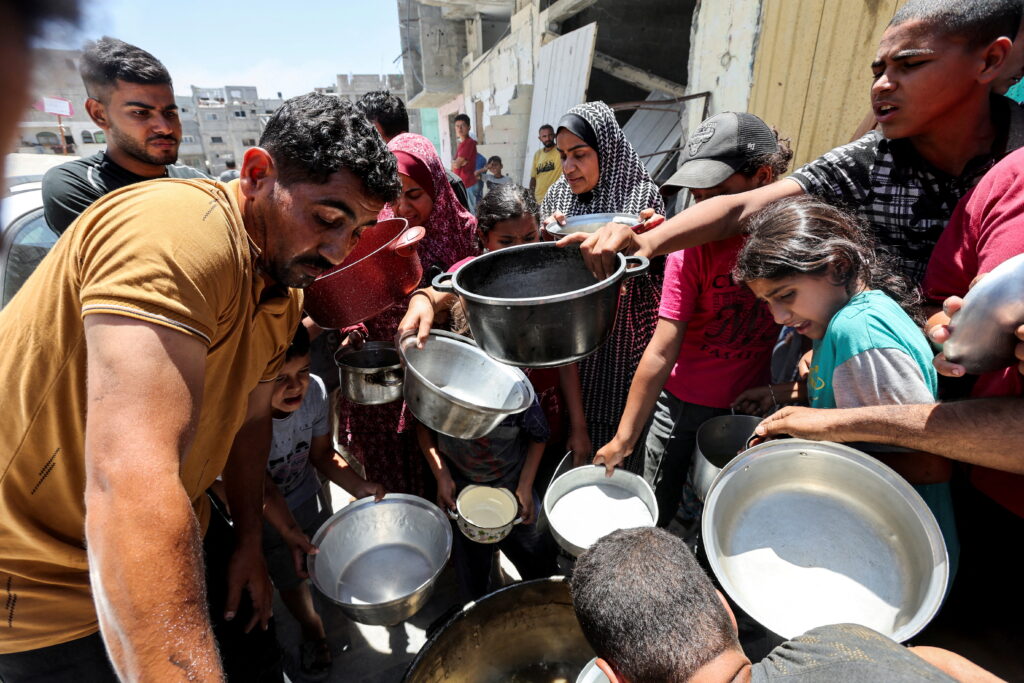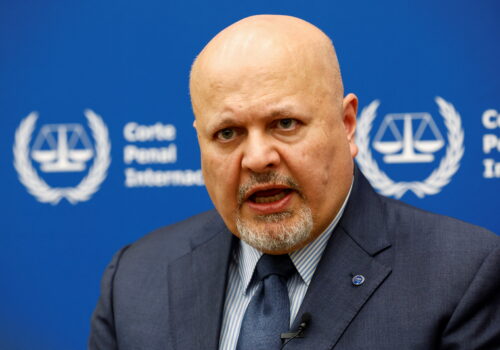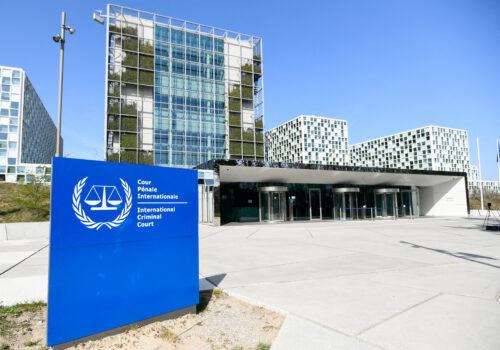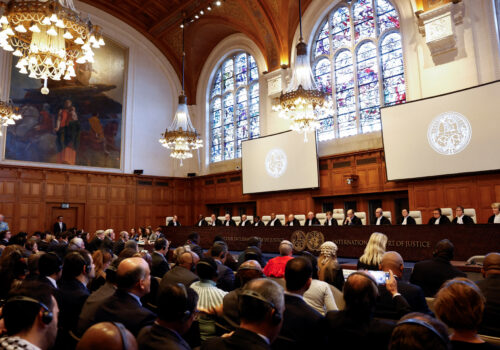Israeli officials are accused of weaponizing starvation in Gaza. Here’s what you need to know.
On May 20, International Criminal Court (ICC) Prosecutor Karim A. A. Khan announced his request for arrest warrants against senior Hamas leaders and Israeli officials, including Hamas chief Yahya Sinwar and Israeli Prime Minister Benjamin Netanyahu, for alleged war crimes and crimes against humanity committed during and since Hamas’s attack against Israel on October 7, 2023.
At the core of the charges against Netanyahu and Israeli Defense Minister Yoav Gallant are allegations that the two were part of a “common plan” to use “the starvation of civilians as a method of warfare” in Gaza—a war crime. In addition, the Office of the Prosecutor (OTP) is seeking charges for various crimes against humanity associated with the crime of starvation, including extermination and/or murder, persecution, and “other inhumane acts.”
This moment is especially significant for the ICC because—despite evidence indicating its commission in past and ongoing conflicts—the war crime of starvation has never before been prosecuted at the international level. The lack of precedent has until now made prosecutors hesitant to venture into untrodden legal territory, thus rendering the crime “an issue that floats at the periphery of [war crimes] prosecutions.” Given the prevalence of civilian starvation in armed conflict—particularly as a result of urban siege warfare—the decision by the ICC’s pretrial chamber in this matter could help shape international practice for identifying the war crime of starvation and associated starvation crimes, and create a clearer pathway to accountability for victims.
The recently alleged crimes, however, are not the first accusations that Israeli leaders have employed starvation tactics in Gaza since October 7, 2023. Since Gallant’s order for a “complete siege” of Gaza on October 9, the United Nations (UN), human rights organizations, and Khan himself have warned that the closure of border crossings, restriction of essential supply transfers, severing of water and electricity, attacks on humanitarian aid convoys, and the killing of Gazans gathering to receive aid could constitute starvation crimes. Just last month, the UN’s Commission of Inquiry on Palestine released a report finding that through the siege of Gaza, Israeli officials have “weaponized the withholding of life-sustaining necessities” including food, water, electricity, fuel, and humanitarian assistance.
Israeli officials have consistently denied allegations that they are restricting aid deliveries to Gaza, instead citing diversion and black-market resale of aid by Hamas as primary causes of the hunger crisis. Hamas did recently manage to divert and temporarily seize a shipment of aid delivered through Jordan—the “first widespread case of diversion that we have seen” in Gaza, according to US State Department Spokesperson Matthew Miller. Officials have also accused UN agencies, including the UN Relief and Works Agency for Palestinian Refugees (UNRWA) and the World Food Programme, of bottlenecking aid distribution and exacerbating the conflict. Israel has further claimed that UNRWA is complicit in aid diversion and maintains the agency’s alleged links to Hamas.
What happens next?
The OTP’s requests now lie with a pretrial chamber of the ICC, which will review the applications and determine whether there are “reasonable grounds to believe” that the parties “committed crimes within the jurisdiction of the Court.”
To meet the “reasonable grounds” standard, the application should outline the crimes alleged, a “concise statement of the facts which are alleged to constitute those crimes,” and a summary of the evidence supporting the belief that an individual is responsible for those crimes. However, Khan has said that the OTP’s investigation and applications regarding Gaza have sought to exceed an even higher standard of proof—in his words, a standard of “realistic prospect of conviction.” It is probable that the prosecutor imposed a higher standard than what is required to ward off criticisms of bias from Israel and its allies, who have previously threatened the court and questioned its legitimacy.
Although Israel is not a member of the ICC, the Palestinian Authority’s 2015 accession to the Rome Statute allows the court to exercise jurisdiction over crimes perpetrated by Palestinian nationals—including Hamas fighters—and those crimes occurring at least partly on Palestinian territory, including those committed or ordered by Israeli officials. The decision of a pretrial chamber in February 2021 further affirmed ICC jurisdiction over Palestinian territory, including Gaza. This same principle enables the ICC to investigate and prosecute crimes committed in Ukraine despite Russia not accepting the jurisdiction of the ICC.
It also bears noting that the war crime of starvation initially only applied when committed in the context of an international armed conflict (IAC), and Palestine has not ratified the Rome Statute’s 2019 amendment extending the crime to encompass non-international armed conflicts. Khan, with the support of a report by a panel of international law experts, reasons that the war is an IAC due to Israel’s use of force or status as an occupying power in Gaza. The pretrial chamber may only opt to issue arrest warrants for the war crime if it determines that there is in fact an IAC underway between Israel and Palestine.
Should arrest warrants be issued against Netanyahu and Gallant, all states party to the ICC will be obligated to arrest and surrender them to the court. While it remains to be seen if states will actually comply with the order, statements from France, Belgium, Germany, and Slovenia have affirmed their support for the ICC since the requests were submitted.
What does the law say, and how does it apply to Gaza?
The weaponization of hunger is considered one of the oldest methods of warfare, but its recognition as a war crime within the ICC’s jurisdiction is relatively new.
More than twenty years after its prohibition in two additional protocols to the Geneva Conventions, the crime of starvation was codified under the Rome Statute of the ICC in 1998. Article 8(2)(b)(xxv) renders “intentionally using starvation of civilians as a method of warfare” a war crime, so long as perpetrators intentionally deprive civilians of “objects indispensable to their survival,” or OIS.
To prove the war crime of starvation, it must be shown that a perpetrator indeed deprived civilians of OIS—such as “foodstuffs, agricultural areas for the production of foodstuffs, crops, livestock, drinking water installations and supplies, and irrigation works”—a non-exhaustive list defined in the Geneva Conventions. Directives by Israeli officials to impede aid delivery, and the razing of agricultural areas and cutting off fuel or water sources could suffice in this regard. Although recent reports have spurred debate over whether the situation in Gaza technically qualifies as a famine, such a determination is not required for the war crime to attach. It is not necessary to prove that the conduct in question resulted in civilians’ deaths or suffering—solely demonstrating that a perpetrator took action to deprive civilians of indispensable objects is enough.
However, it is required to prove two elements of intent: that the perpetrator intended (1) to deprive civilians of OIS and (2) “to starve civilians as a method of warfare.” Without the aid of prior case law, the threshold for satisfying the second element is uncertain. Must perpetrators aim to weaponize starvation specifically, or are acts that would foreseeably starve civilians sufficient?
In favor of the latter interpretation, the so-called default intent standard in the ICC Statute likely indicates that this second element may be established if a perpetrator took actions knowing that civilian starvation could result or was aware it would occur “in the ordinary course of events.” Under this understanding of intent, proving that Netanyahu and Gallant were virtually certain that civilians would starve without humanitarian aid deliveries, along with the severing of water and electricity to Gaza, could help establish intent.
What is the wider significance?
Already, the ICC has made a pivotal move in recognizing the need for accountability for starvation crimes. As UN-backed documentation from recent and ongoing conflicts in Yemen, South Sudan, and Myanmar has shown, the weaponization of food remains a pervasive feature of armed conflict. Notably, actions taken in the laying of sieges—as seen in Aleppo, Madaya, Eastern Ghouta in Syria, the Tigray region of Ethiopia, and Mariupol—exhibit increasing overlap with starvation tactics.
Khan’s application for arrest warrants here opens the door for further efforts to investigate and charge the war crime of starvation, as well as war crimes and crimes against humanity associated with starvation. Regardless of whether a trial ultimately results, a potential issuance of charges alone could help clarify the contours of the crime and create a clearer pathway to accountability for victims from other contexts.
Alana Mitias is the assistant director of the Atlantic Council’s Strategic Litigation Project.
Yousuf Syed Khan is a nonresident senior fellow with the Strategic Litigation Project at the Atlantic Council. Several of his most visible legal contributions have centered on starvation-related crimes, including leading the drafting of the first ever report by a UN-mandated mechanism on starvation as a method of warfare.
Further reading
Mon, May 20, 2024
Experts react: The ICC prosecutor wants Netanyahu and Hamas leaders arrested for war crimes. What’s next?
New Atlanticist By Atlantic Council experts
International Criminal Court Prosecutor Karim A.A. Khan just applied for arrest warrants for Hamas chief Yahya Sinwar and Israeli Prime Minister Benjamin Netanyahu, among others.
Mon, May 6, 2024
Seven questions (and answers) if the ICC issues arrest warrants for Israeli officials
New Atlanticist By Mark Klamberg
Israel’s government has voiced its concern in recent days that the International Criminal Court will soon issue arrest warrants for Israeli officials in connection with the war in Gaza.
Fri, Jan 26, 2024
Experts react: What the International Court of Justice said (and didn’t say) in the genocide case against Israel
New Atlanticist By Atlantic Council experts
South Africa asked the court to order an immediate cease-fire. Israel asked the court to throw out the case. Atlantic Council experts explain what the court did instead.
Image: Palestinians gather to receive food cooked by a charity kitchen near houses destroyed in the Israeli military offensive, in Khan Younis in the southern Gaza Strip, May 30, 2024. REUTERS/Ramadan Abed





